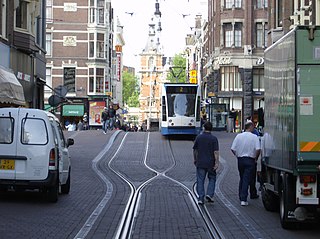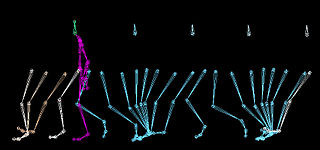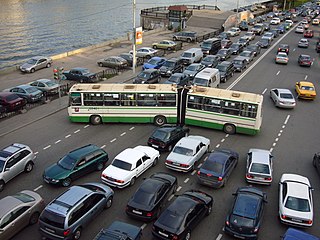Bicycle-friendly policies and practices help some people feel more comfortable about traveling by bicycle with other traffic. The level of bicycle-friendliness of an environment can be influenced by many factors resulting from town planning and cycling infrastructure decisions.

Congestion pricing or congestion charges is a system of surcharging users of public goods that are subject to congestion through excess demand such as higher peak charges for use of bus services, electricity, metros, railways, telephones, and road pricing to reduce traffic congestion; airlines and shipping companies may be charged higher fees for slots at airports and through canals at busy times. Advocates claim this pricing strategy regulates demand, making it possible to manage congestion without increasing supply.

Accessibility is the design of products, devices, services, or environments for people with disabilities. The concept of accessible design and practice of accessible development ensures both "direct access" and "indirect access" meaning compatibility with a person's assistive technology.

An information infrastructure is defined by Ole Hanseth (2002) as "a shared, evolving, open, standardized, and heterogeneous installed base" and by Pironti (2006) as all of the people, processes, procedures, tools, facilities, and technology which supports the creation, use, transport, storage, and destruction of information.

Transportation demand management, traffic demand management or travel demand management is the application of strategies and policies to reduce travel demand, or to redistribute this demand in space or in time.
Francis Eric Knight Britton is an American political scientist and sustainability activist who has lived and worked in Paris, France since 1969. As the main convenor of The Commons: Open Society Sustainability Initiative and its various networks, he is well known for promoting integrated public transport, carsharing and bike sharing.

Transport Scotland was created on 1 January 2006 as the national transport agency of Scotland. It is an Executive Agency of the Scottish Government and accountable to Scottish Ministers.
Interreg is a series of programmes to stimulate cooperation between regions in the European Union, funded by the European Regional Development Fund. The first Interreg started in 1989. Interreg IV covered the period 2007–2013. Interreg V (2014-2020) covers all 28 EU Member States, 3 participating EFTA countries, 6 accession countries and 18 neighbouring countries. It has a budget of EUR 10.1 billion, which represents 2.8% of the total of the European Cohesion Policy budget. Since the non EU countries don't pay EU membership fee, they contribute directly to Interreg, not through ERDF.
Airport Regions Conference (ARC) is an association of European regional and local authorities that host major international airports. It was founded in 1994. The ARC brings together a wide range of expertise at the interface of air transport and local and regional policies. A common concern is to balance the economic benefits generated by the airports against their environmental impact, notably the effect on the quality of life of local residents.

A Smart city is an urban area that uses different types of electronic Internet of things (IoT) sensors to collect data and then use these data to manage assets and resources efficiently. This includes data collected from citizens, devices, and assets that is processed and analyzed to monitor and manage traffic and transportation systems, power plants, water supply networks, waste management, crime detection, information systems, schools, libraries, hospitals, and other community services.

Transport in the European Union is a shared competence of the Union and its member states. The European Commission includes a Commissioner for Transport, currently Violeta Bulc. Since 2012, the Commission also includes a Directorate-General for Mobility and Transport which develops EU policies in the transport sector and manages funding for Trans-European Networks and technological development and innovation, worth €850 million yearly for the period 2000–2006.
The Intelligent Car Initiative is a policy framework set up by the European Commission to tie up all activities relating to 'intelligent' automobiles. The term covers all vehicles that are equipped with modern information and communication technologies (ICT) to increase road safety and/or the flow of traffic, or to reduce the environmental impact of road transport. A well-established and widely known 'intelligent' device would be the anti-lock braking system ABS, which prevents the wheels from locking while braking and thus enables the driver keeping the car under control. An example for a more recent system would be the electronic brake assistance which helps the driver brake effectively, or even brakes the car on its own if a collision is imminent and there is no driver reaction at all.
Ecomobility is travel through integrated, socially inclusive, and environmentally friendly transport options, including and integrating walking, cycling, public transport and other climate and people friendly innovative modes of transport. By enabling citizens and organizations to access goods, services, and information in a sustainable manner, ecomobility supports citizens’ quality of life, increases travel choices, and promotes social cohesion.

Active mobility, active travel, active transport or active transportation, is a form of transport of people and sometimes goods, that only uses the physical activity of the human being for the locomotion. The most well-known forms of active mobility are walking and cycling, though other mobility means such as running, skateboard, kick scooter and roller skates are also forms of active mobility. In certain latitudes and elevations, practical transportation may also include cross-country skiing and snowshoeing, perhaps only in the winter season.
PTV Planung Transport Verkehr AG is a German company specialising in software solutions and consulting services for traffic and transportation, mobility, and logistics. "Vision Traffic Suite", their transport planning software, and "PTV Map&Guide", their program for route planning, comprise the PTV AG's product portfolio. According to the manufacturer, over 2,000 customers in more than 90 countries use the Vision Traffic Suite in the fields of transport modelling and traffic flow calculation. PTV ranks among the top 1,000 global market leaders in Germany according to Germany's Manager Magazin. The German company PTV Planung Transport Verkehr AG is a member of PTV Group.
The New Mobility Agenda is an international institution which, although a virtual and open collaborative project today, was originally set up by an international working group meeting at the Abbey de Royaumont near Paris in 1974 with the support of the Parisian OECD to challenge old ideas and practices in the field of urban transport through a long term collaborative program of information exchange, education and peer support. The Agenda today draws together the experience, expertise and support of more than four thousand individuals and groups worldwide in an open collaborative peer network. One of the original proponents of this approach, Professor Mikoto Usui then director of the OECD Development Centre, referred to it in the founding meeting at the "Abbé de Royaumont as an "invisible college". Drawing together the experience and expertise of more than four thousand individuals and groups worldwide, who are networked via a combination of websites, discussion groups and fora, and collaborative projects, the Agenda takes an approach to transportation planning, policy and practice that has gained considerable force over the last two decades—provides a leading-edge alternative to earlier methods of looking at and providing mobility for people and goods in cities. The Agenda has received prestigious awards for its contributions, including the Stockholm Environment Challenge Prize (2000) and the World Technology Environment Award (2002).
Urban China Initiative (UCI) is a new initiative with the aim to establish a think-tank with the express mission of finding and implementing effective solutions to China's urbanization challenge. It is a joint initiative led by Columbia University, the School of Public Policy and Management at Tsinghua University, and McKinsey & Company. UCI was launched in November 2010.
The Istituto Superiore Mario Boella (ISMB) was a center for applied research in the fields of telecommunication engineering and information and communication technologies located in Turin, Italy.
A Sustainable Urban Mobility Plan (SUMP) is a planning concept applied by local and regional authorities for strategic mobility planning. It encourages a shift towards more sustainable transport modes and supports the integration and balanced development of all modes. A SUMP is instrumental in solving urban transport problems and reaching local and higher-level environmental, social, and economic objectives.














